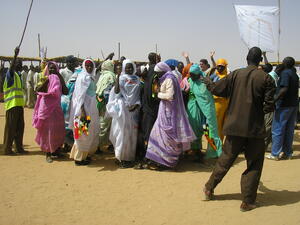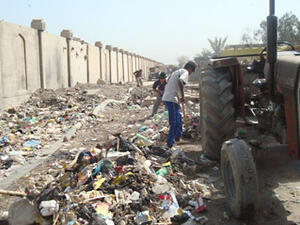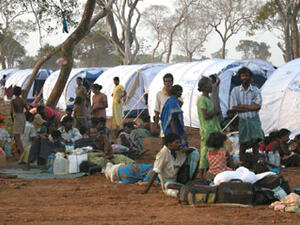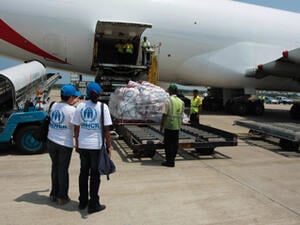UNHCR and Pakistan sign new agreement on stay of Afghan refugees
UNHCR and Pakistan sign new agreement on stay of Afghan refugees

Minister of States and Frontier Regions Najamuddin Khan and UNHCR Representative Guenet Guebre-Christos sign the agreement on Afghan refugees.
ISLAMABAD, Pakistan, March 13 (UNHCR) - The UN refugee agency and the Pakistani government on Friday signed an agreement to extend the stay of Afghan refugees in Pakistan until the end of 2012.
The letter of mutual intent was signed in Islamabad by UNHCR Representative Guenet Guebre-Christos and Minister of States and Frontier Regions (SAFRON) Najamuddin Khan.
It sets out measures to be taken regarding the temporary stay of Afghans in Pakistan, their gradual and voluntary repatriation, and international support to Pakistan for hosting one of the largest refugee populations in the world.
There are currently some 1.7 million registered Afghans in Pakistan, with 45 percent residing in refugee villages and the rest scattered among host communities.
Under the new agreement, SAFRON will take measures to extend the validity of the Proof of Registration (PoR) cards issued to Afghan citizens living in Pakistan until the end of 2012. The current PoR cards, issued during an extensive registration exercise in 2006, are due to expire at the end of this year.
In addition, the ministry undertakes to revise the government's current strategy for the management of Afghans living in Pakistan beyond 2009 and to support the extension of the current tripartite agreement between UNHCR and the governments of Pakistan and Afghanistan until the end of 2012.
Welcoming the agreement, UNHCR's Guebre-Christos said the agency was committed to supporting the safe, voluntary and gradual repatriation of Afghans at a pace that recognizes the current reintegration challenges in Afghanistan.
"This is a responsible move by Pakistan, which recognizes both the realities on the ground in Afghanistan and the importance of robust systems to legalize and manage the temporary stay of Afghans in Pakistan," she said.
UNHCR has also agreed to raise funds to support the Registration Information Project of Afghan Citizens (RIPAC) to improve the quality of registration data and to update and correct the PoR cards so that information about the Afghan population remains current.
In addition, UNHCR will engage the international community to fund the US$140 million Refugee Affected and Hosting Areas (RAHA) programme - benefitting Afghans and Pakistanis - over five years. Under RAHA, UNHCR and its UN partners will support development projects in 21 districts of Pakistan, mostly in Balochistan and North West Frontier Province, which together have hosted most of the Afghan refugees in the country.
Development projects under the RAHA scheme will help people rebuild livelihoods, boost employment prospects, revive agricultural and irrigation systems, and repair rural roads. Other aspects of the programme will improve health and education services, and restore the environment in those areas most affected by the hosting of refugees.
Today's signing builds upon previous agreements within the tripartite framework, including the 16th meeting here in August 2008, which acknowledged that future planning for the voluntary return of registered Afghan refugees should reflect reintegration challenges and ground realities in Afghanistan.
Since 2002, almost 3.5 million Afghans have returned home from Pakistan with UNHCR assistance. Overall, some 4.3 million Afghans have returned home from Pakistan, Iran, and other countries with the agency's help.
By Ariane Rummery in Islamabad, Pakistan








